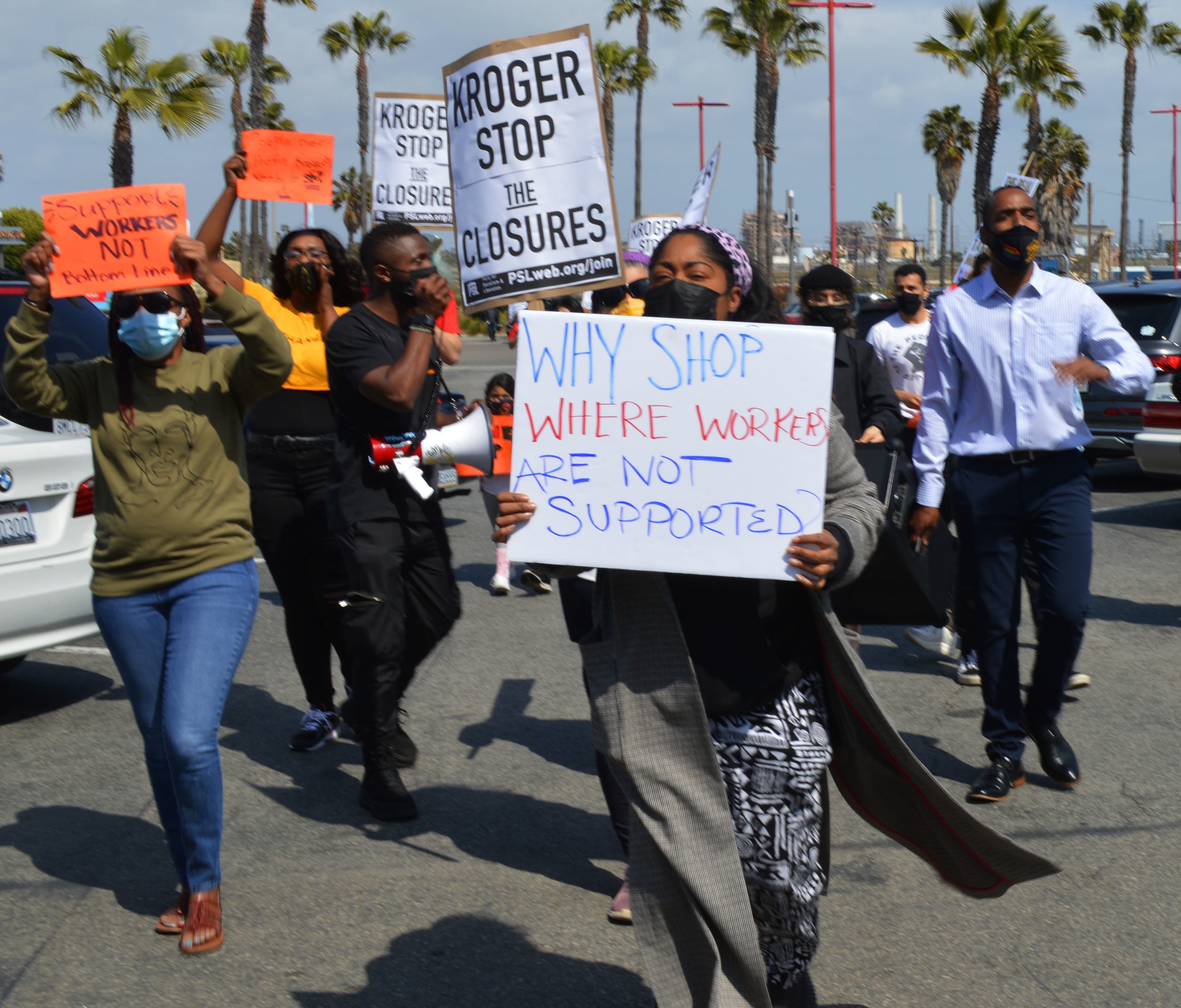Wave Wire Services
LOS ANGELES — The Kroger Co. has announced it is closing three Los Angeles stores following the City Council’s vote March 3 to approve an ordinance that requires large grocery and pharmacy retailers to offer employees an additional $5 per hour in hazard pay amid the COVID-19 pandemic.
A Food4Less at 5420 W. Sunset Blvd., and two Ralphs, one at 9616 W. Pico Blvd. and the other at 3300 W. Slauson Ave., will close on May 15, Kroger said.
The Cincinnati-based company has already drawn criticism after announcing on Feb. 1 that it will close a Ralphs and a Food4Less in Long Beach following that city’s $4 hazard pay ordinance. Those stores are set to close April 17.
Kroger said in a statement Wednesday that the three stores it plans to close are “underperforming.”
“It’s never our desire to close a store, but when you factor in the increased costs of operating during COVID-19, consistent financial losses at these three locations, and an extra pay mandate that will cost nearly $20 million over the next 120 days, it becomes impossible to operate these three stores,” a Kroger spokesperson said.
Marc Perrone, president of United Food and Commercial Workers International Union, which represents 1.3 million workers in the grocery, meatpacking and other industries, said the company “has made billions in pandemic profits thanks to essential grocery workers in California and across the country. Kroger’s action is a cruel attack on essential workers and threatens the food supply for California communities devastated by the explosion of COVID-19 infections in recent months.
“Essential workers in grocery stores are putting their health at risk every day to make sure families can put food on the table and city leaders are stepping up to ensure they have the hazard pay they have earned.”
Los Angeles City Council members approved their ordinance on a 14-1 vote, with Councilman John Lee as the only dissenter.
The $5 hazard pay is required for all non-managerial employees at grocery or drug retail stores with more than 300 employees nationwide, or more than 10 employees on-site, as well as retail stores, such as Walmart and Target, that dedicate 10% of their sales floor to groceries or drug retail.
The hazard pay is given in addition to employees’ base wages for 120 days. According to a report by Los Angeles’ chief legislative analyst, which cited ZipRecruiter, the average grocery store worker in Los Angeles earns $17.51 an hour. Kroger said that the average L.A. Ralphs and Food4Less employee rate is $18 an hour.
Carlos Viramontes, board member of the Latino Food Industry Association, blamed politicians for the stores’ closures.
“Our members deliver the produce, pack the meat and drive the trucks that deliver everything from food to paper goods to the grocery stores,” he said. “When a store shuts down, especially in areas serving predominantly Latinos and people of color, our members lose business and their workers suffer. The politicians who are ignoring the warnings and passing these extra pay ordinances are putting hard-working employees and working families at risk.”
Ron Fong, president and CEO of the California Grocers Association, also criticized the ordinance.
“As we said weeks ago, extra pay ordinances will have negative consequences and harm customers and workers,” he said. “Three more store closures in Los Angeles County means workers there stand to lose their good-paying jobs with generous benefits. Customers lose access to a neighborhood grocery close by. It’s a lose-lose all the way around and it is the direct result of elected officials who are passing these unworkable and costly mandates.”
Several Los Angeles City Council members cited moral reasons for extra compensation to grocery store frontline workers and criticized companies that threatened to close stores due to hero pay ordinances.
“Fair compensation is the very least that our grocery store workers deserve after all they have done for us,” Council President Nury Martinez, who introduced the original motion with Councilman Mitch O’Farrell, said during the council’s discussion of the ordinance on Feb. 24.
“Cashiers, stockers, baggers and so many more have risked their lives every day since [last] March making minimum wage to make sure we have everything we need to stay safely at home to get through this crisis,” she said. “While these companies have seen massive profits, it has not trickled down to their employees. These companies can afford to pay the hazard pay, they just don’t want to.”
Councilman Paul Koretz said, “Supermarkets, as we all know, have made high profits, and yet some are threatening to close. It’s clearly out of spite or out of an attempt to leverage us.”
Kroger claimed that grocery stores operate “on razor-thin profit margins.”
The Los Angeles County Board of Supervisors adopted an urgency ordinance on Feb. 23 to require $5 additional pay for national grocery and drug retail employers in unincorporated areas of the county.
The California Grocers Association filed federal lawsuits against Long Beach, West Hollywood and Montebello, seeking to declare hazard pay mandated by those cities as invalid and unconstitutional, contending that grocers will not be able to absorb the additional pay without raising prices, closing stores, reducing hours or laying off employees. A federal judge denied the association’s bid to temporarily overturn the Long Beach ordinance.
Los Angeles’ chief legislative analyst determined that potential economic impacts of the ordinance include temporary increases of labor costs as a percentage of the company’s sales, potential higher prices for consumers, potentially delayed store openings, renovations and wage increases or promotions for employees, potential pressure on struggling stores that could lead to stores closing and reduced hours for some employees.
However, the analyst also determined that the higher wages could also benefit other city businesses, as more people would have extra money to buy additional goods. It could also help people pay down their debts and increase their savings.
“As the [legislative analyst’s] report makes clear, this ordinance comes with trade-offs for both retailers and employees, pros and cons with anything we do, but it should be appreciated that this effort is a temporary measure that increases wages of our grocery and retail workers,” Councilman Mark Ridley-Thomas said before the measure’s first reading on Feb. 24. “I want to underscore that it is a matter of justice.”
Lee, the lone dissenter, said he hoped the council could come up with a different solution than what he called “a gross overreach of government into business and what they should be paying their employees.”
“At the end, I don’t want to affect the people who are going to be hurt the most by this, and that is the people who live in the poorest communities of the city of Los Angeles, the people who live in my district,” he continued.











